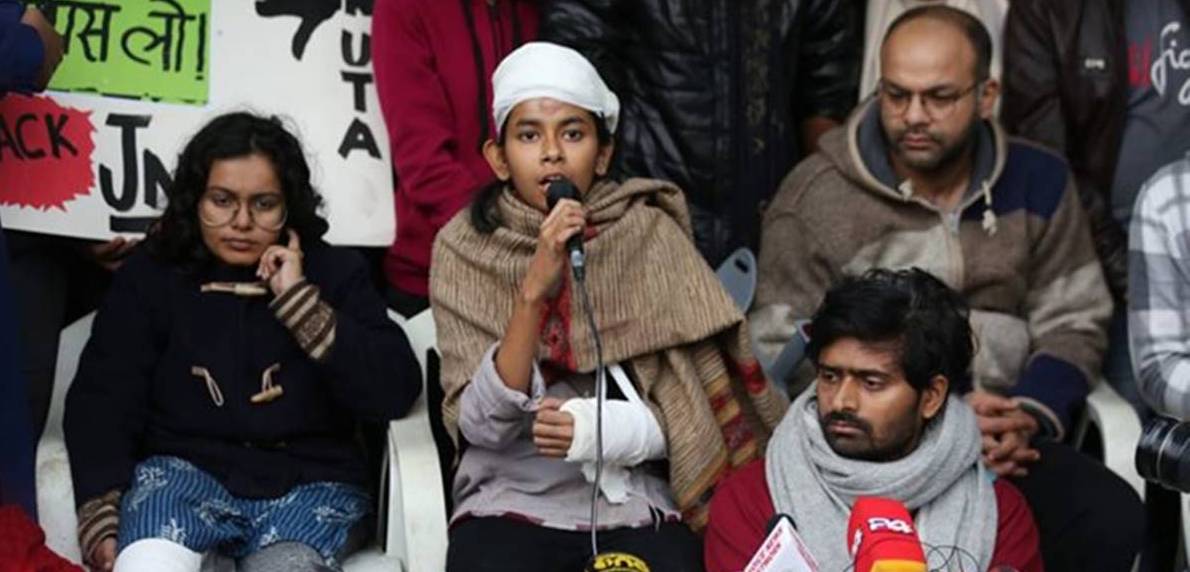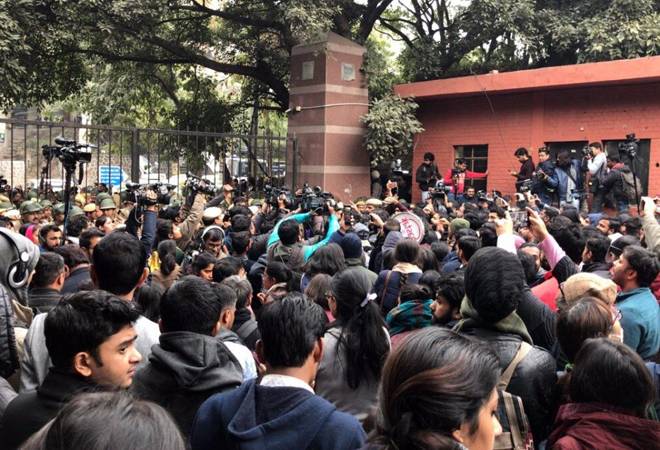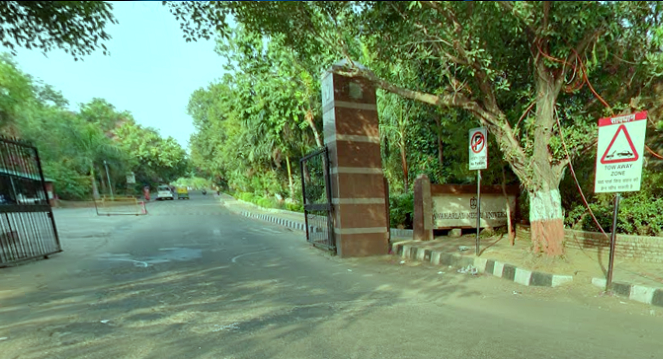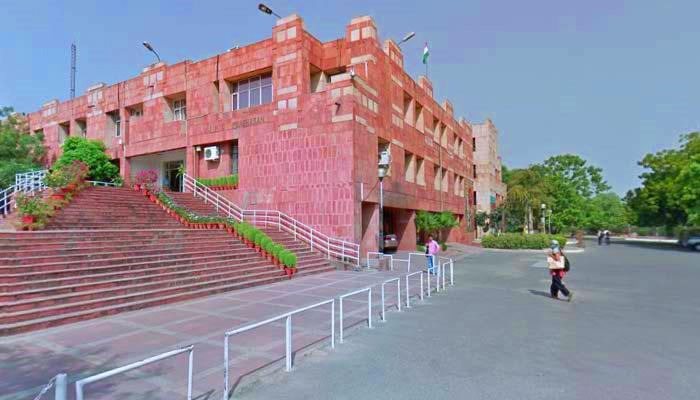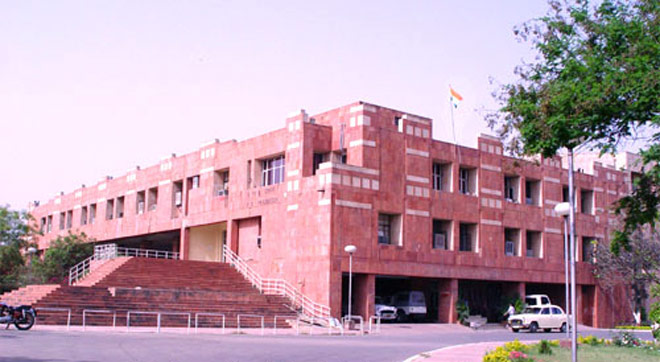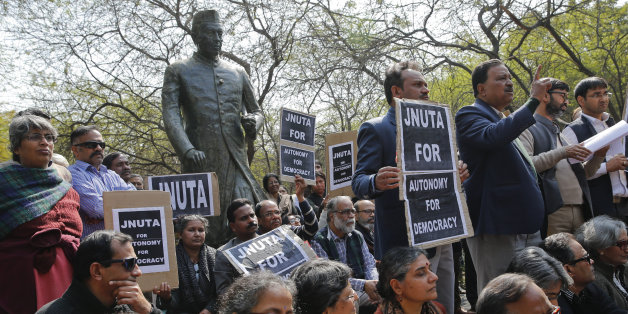
JNU CRISIS
In this perceptive piece, the author who has chosen to remain anonymous has expressed his anguish, raised nuanced pedagogic concerns, and articulated his voice of dissent against the measures the Jawharlal Nehru University administration has been taking to destroy the foundations of this iconic university.
By A JNU Professor
Possibly, there is something terribly wrong with the JNU administration—the way it thinks, acts and behaves. With regimentation, surveillance and naked violation of all democratic principles it has created a toxic environment in which it becomes exceedingly difficult to live with dignity and teach meaningfully. As a teacher who has been serving this university for last twenty-eight years, I see the collapse of all great ideals that made this university remarkably different. The Vice-Chancellor, I am sorry to say, has never bothered to understand the spirit of this place—its confluence of diverse knowledge traditions, its critical consciousness and culture of dialogue, its fairly decentralized system that trusts the autonomy of the teacher and the possibility of a sustained interaction between the teacher and the taught. Instead, with a purely one-dimensional technical mind guided by a high degree of academic conservatism and absolute indifference to the ethos of a liberal university, he, it seems, finds vicarious pleasure in destroying the foundations of the university. With his ‘discretionary power’ he violates all democratic principles, removes all ‘disobedient’ Deans and Chairpersons from their positions, threatens students, imposes all sorts of arbitrary rules, and favours those who, because of the reasons best known to them, love to remain closer to the centre of power. At a time when the ruling establishment with its inherent skepticism towards liberating education, and the aspiring middle class corrupted by the instrumental logic of the neo-liberal market see a public university like JNU as a ‘problematic’ zone, the Vice- Chancellor, it appears, is playing the role assigned to him—finish its core foundations, alter its character, generate fear among students and teachers, divide them, and make them run for everything, be it a duty leave application or the submission of a fellowship form so that everyday functioning of the university becomes alnost impossible.
Satyagraha: Beyond the Parameters of Partisan Politics
As I express my anguish and write this piece, one thing I wish to make it clear. I see it beyond the rhetoric of partisan politics, beyond the duality of ‘left’ vs. ‘right’. I do not belong to any camp. I am not an activist in the campus political life. As an ordinary teacher, there is only one thing I do. I teach, do my job honestly and silently, and try my best to sustain an academic culture that values the spirit of dialogue and reasoned debate, the ethos of epistemological pluralism, and the ethic of compassion that resists the instrumental use of academics. Even though I choose to remain invisible in the political realm, I have been raising my voice precisely because I believe that it is a struggle for the larger good of JNU. All of us who love the ethos of a liberal university, I believe, ought to come forward and resist what the Vice-Chancellor is doing. It does not matter whether one is a Marxist or a Gandhian, an Ambedkarite or a feminist, a scientist or a social philosopher. What really matters is the acceptance of a set of core values—seeing students and teachers as human souls exploring the world together, refusing to see the university as a ruthlessly hierarchical bureaucratic space, and celebrating the spirit of responsible freedom and ethically/pedagogically enriched collective practice. When the leader of the institution shows no sensitivity to these values, and instead reduces all of us into objects of surveillance and bureaucratic control, it is important to protest. There is no other way of collective redemption.

The Ultimate Irony: The Eyes that Refuse to See
In this context I must speak once again of the issue of mandatory attendance. I have no hesitation in accepting that we do need a bit of self-introspection. As students and teachers, we need to be more accountable, and work together with absolute honesty and sincerity to reaffirm our conviction that we are truly responsible learners, and hence we do not need any surveillance machinery to excel in the sphere of work and give our best. I have often argued that the best answer to the dictate of mandatory attendance is voluntary participation. I believe that the spirit of JNU is precisely the self-confidence it seeks to generate among us—we are eager learners, we celebrate every moment of learning, and classrooms are vibrant spaces we create for expanding our horizons. Possibly, the Vice-Chancellor has never been exposed to this emancipatory pedagogic practice. Possibly, there is only one thing he knows— use power, make a rule, generate fear, create a culture of ‘discipline’ and punishment, and people will begin to work. Possibly, for some reason or other (say, the increasing dependence on online material, or the growing atomization causing general disinterestedness in a shared space) a section of students became somewhat casual, took the freedom for granted, did not work on themselves, began to abstain from classes more frequently, and made the situation somewhat complex and ambiguous, even for otherwise well-meaning teachers.
Yet, I insist that the rule of mandatory attendance is wrong and ugly. There are three reasons. First, it introduces fear and inauthenticity, and destroys what ought to exist in a dialogic classroom: trust, voluntarism and genuine spirit of learning. Second, as a teacher, I have always felt that an interaction with five eager and curious learners is more valuable than a lecture in front of fifty disinterested students who have come to the class only for attendance. Third, it rules out the creative possibility of initiating effective pedagogic measures—say, making teaching more participatory and innovative, evolving new modes of assignment that demand classroom participation rather than mere memorization of facts and theories, and giving responsibilities to respective centres to initiate workshops for creating a new awareness. The irony is that the Vice-Chancellor does not want to know that most of us in our own ways have been trying to do this.
No wonder, in the eyes of the Vice-Chancellor –the eyes that refuse to see— I too am ‘disobedient’ because I have raised my voice against mandatory attendance, and I have not asked my students to sign the attendance registrar. Yet, there is no guilt in this act of ‘disobedience’. Because I believe that never did I escape from my swadharma—working with students, teaching honestly, and repeatedly urging them to join me in a collective project of liberating pedagogy. I have experienced that my students do cooperate and show remarkable interest in learning. No mandatory attendance; yet, the classroom is always full, and there is absolute enthusiasm for extra classes. Even in this disturbed semester, we have evolved together—academically and ethically. And I am sure that many of colleagues too have the same story to share.
What will the Vice-Chancellor do? Will his eyes see? Or will he punish us for ‘disobedience’? Are we ready to suffer for our convictions? Or like ‘obedient employees’ are we going to accept everything the administration imposes on us? I believe that finally the time has come for many of us to confront this ethical/pedagogic question.
We believe that if individuals like you come forward and SUPPORT THIS ENDEAVOR can make the magazine self-reliant in a very innovative way.

